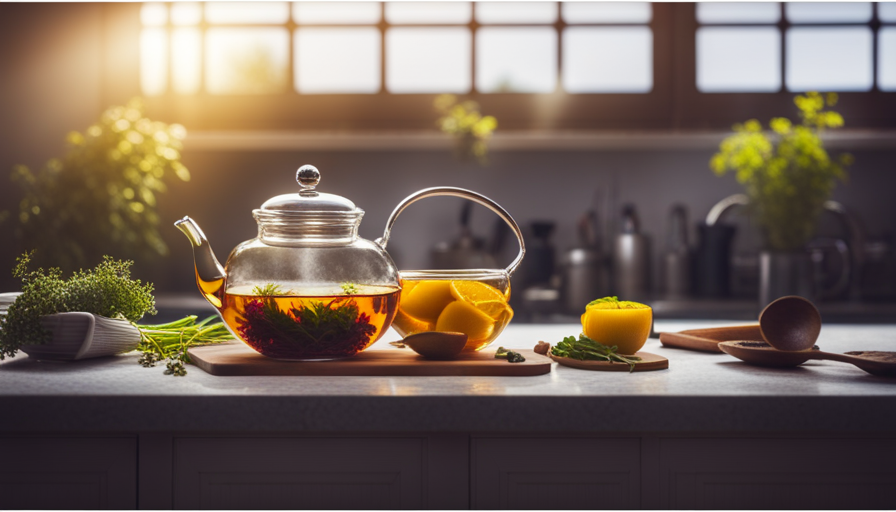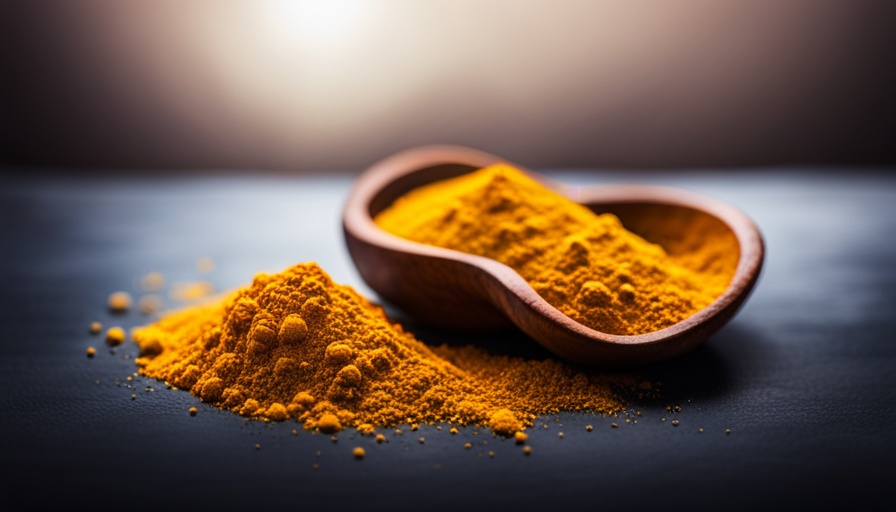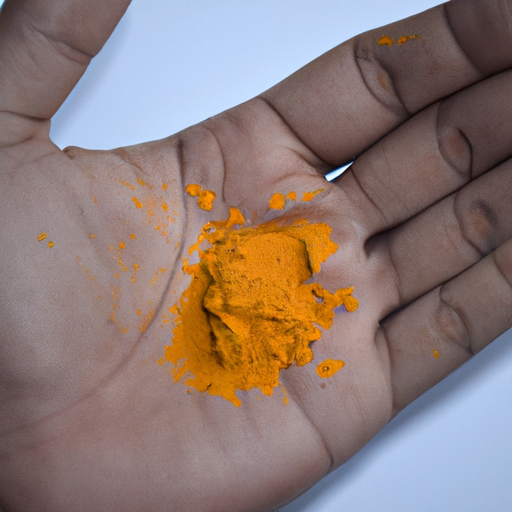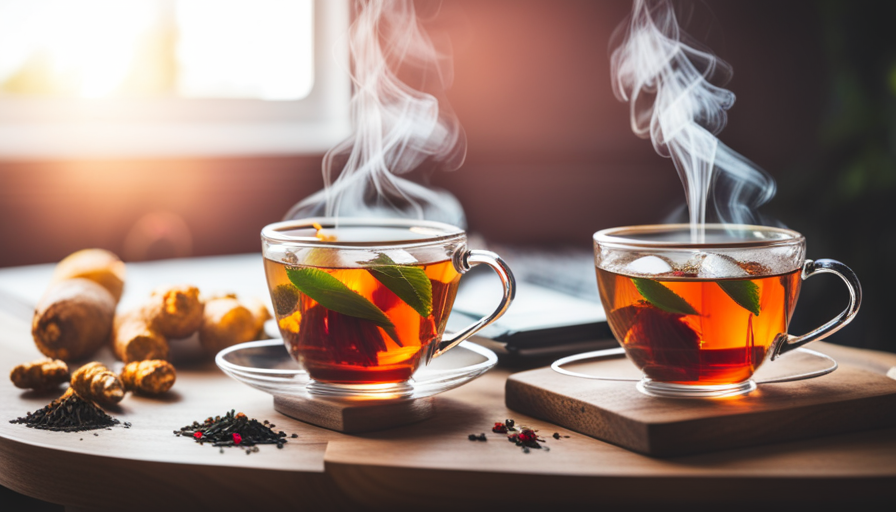Are allergies causing you distress? Don’t worry! I have a spicy remedy that will help you breathe easier quickly.
In this article, I’ll walk you through the simple yet effective process of making ginger tea for allergies. Ginger tea has long been hailed for its powerful anti-inflammatory properties, making it a natural remedy for allergy symptoms. By incorporating this aromatic root into your daily routine, you can find relief from sneezing, itchy eyes, and congestion.
So, let’s dive right in! Gather your ingredients, prepare the ginger, and brew your ginger tea. For an added boost, don’t forget to add a drizzle of honey and a squeeze of lemon.
Say goodbye to allergies and hello to a soothing cup of ginger tea. Trust me, your sinuses will thank you!
Key Takeaways
- Ginger tea is a natural remedy for allergies and can alleviate congestion and inflammation in the airways.
- Gingerol, a compound found in ginger, inhibits the release of histamine in the body, making ginger tea effective in reducing allergy symptoms.
- Ginger tea can be prepared by boiling water, adding sliced ginger, and simmering for 10 minutes before straining it.
- Honey or lemon can be added to ginger tea for enhanced flavor and soothing qualities.
The Benefits of Ginger Tea for Allergies
Ginger tea is a fantastic natural remedy for allergies, soothing your itchy throat and watery eyes. The anti-inflammatory properties of ginger help reduce the symptoms caused by allergens in the air. It contains a compound called gingerol, which has been found to inhibit the release of histamine in the body, the chemical responsible for causing allergic reactions.
By drinking ginger tea, you can alleviate congestion and reduce inflammation in your airways, making it easier to breathe. Additionally, ginger has antioxidant properties that can strengthen your immune system, helping your body fight off allergens more effectively.
To make ginger tea for allergies, you’ll need a few simple ingredients.
Gather Your Ingredients
Once you’ve got everything you need, it’s time to start brewing your soothing remedy for those pesky allergic reactions. To make ginger tea for allergies, gather the following ingredients:
- Fresh ginger root: Peel and slice a 1-inch piece of ginger for every cup of tea.
- Water: Use 1 cup of water for each serving.
- Honey or lemon (optional): Add a teaspoon of honey or a squeeze of lemon for flavor.
To enjoy this process, take a moment to appreciate the aroma of the ginger as you peel it. Then, fill a pot with the desired amount of water and bring it to a boil. Add the ginger slices and let it simmer for 10 minutes. Finally, strain the tea into a cup and add honey or lemon if desired.
This warm and fragrant ginger tea is a delicious way to prepare the ginger for the next step: brewing the tea itself.
Prepare the Ginger
After gathering your ingredients, it’s time to get the ginger ready for brewing. Peel and slice a 1-inch piece of the aromatic root for every cup of soothing tea you plan to prepare.
The first step is to wash the ginger root thoroughly to remove any dirt or impurities. Then, using a vegetable peeler or a spoon, gently remove the outer skin of the ginger, revealing the pale yellow flesh underneath.
Once peeled, use a sharp knife to slice the ginger into thin rounds or small chunks. This will help release the flavor and aroma of the ginger into the tea.
With the ginger prepared, you’re now ready to brew your ginger tea and experience its allergy-relieving properties.
Brew Your Ginger Tea
Now it’s time to unleash the powerful flavors and soothing properties of this golden elixir by brewing your ginger tea.
Start by bringing a pot of water to a boil. While the water is heating up, take a piece of fresh ginger root, about 1 inch in size, and peel off the skin using a spoon or peeler. Then, grate or thinly slice the ginger into small pieces.
Once the water is boiling, add the ginger to the pot and let it simmer for about 10 to 15 minutes. This’ll allow the flavors and beneficial compounds in the ginger to infuse into the water.
Finally, strain the tea into a cup and enjoy the warm, comforting beverage.
Now, let’s move on to the next step: adding honey and lemon for extra relief.
Add Honey and Lemon for Extra Relief
To enhance the soothing qualities of your ginger elixir, why not add a dollop of honey and a squeeze of fresh lemon for that extra relief you crave?
Honey is known for its anti-inflammatory properties, which can help alleviate allergy symptoms such as a runny nose or itchy throat.
Lemon, on the other hand, is an excellent source of vitamin C, which can boost your immune system and reduce the severity of allergies.
When preparing your ginger tea, simply stir in a teaspoon of honey and squeeze the juice of half a lemon into your mug. Mix well and enjoy the comforting warmth of your allergy-fighting concoction.
Now, let’s move on to the next section and find out how to properly enjoy your ginger tea.
Enjoy Your Ginger Tea
Savor the delightful warmth and invigorating aroma of this golden elixir as you curl up with a good book on a chilly evening, letting the soothing essence of ginger envelop your senses like a cozy blanket on a winter’s night.
Ginger tea not only provides relief from allergies but also offers a range of other health benefits. Its anti-inflammatory properties can help alleviate symptoms such as congestion and itchy eyes. Additionally, ginger is known to boost the immune system, promoting overall well-being.
Incorporating ginger tea into your daily routine can be as simple as brewing a cup each morning or enjoying it as an afternoon pick-me-up. Experiment with different variations, such as adding a slice of lemon or a pinch of turmeric, to enhance the flavor and maximize the benefits.
Transitioning into the next section, discover more ways to incorporate this healing elixir into your daily life.
Incorporate Ginger Tea into Your Daily Routine
Experience the invigorating benefits of ginger tea by effortlessly integrating it into your daily routine. Here are four simple ways to make ginger tea a regular part of your day:
- Start your morning with a cup of warm ginger tea to kickstart your metabolism and boost digestion.
- Replace your afternoon coffee with a soothing cup of ginger tea to provide a natural energy boost without the jitters.
- Enjoy a cup of ginger tea before bed to promote relaxation and improve sleep quality.
- Add ginger tea to your post-workout routine to reduce inflammation and aid in muscle recovery.
Ginger tea offers a variety of health benefits, including its anti-inflammatory and antioxidant properties. By incorporating it into your daily routine, you can experience these benefits and enjoy the refreshing taste of ginger tea throughout the day. Remember to consult with a healthcare professional before making any significant changes to your diet.
Frequently Asked Questions
Can ginger tea help with other symptoms of allergies, such as sneezing and itchy eyes?
Yes, ginger tea can help relieve other symptoms of allergies like sneezing and itchy eyes. Its anti-inflammatory properties help reduce inflammation and its antioxidants may help reduce the allergic response in the body.
How long should I steep the ginger in hot water to extract its medicinal properties?
To extract the medicinal properties of ginger, steep it in hot water for 10-15 minutes. This allows the compounds to infuse into the tea, providing relief for allergies. Remember, patience is a virtue when brewing ginger tea.
Are there any potential side effects or risks associated with consuming ginger tea for allergies?
There are few potential side effects of consuming ginger tea for allergies. These may include mild digestive issues such as heartburn or stomach discomfort. However, it is generally considered safe when consumed in moderate amounts.
Can I use powdered ginger instead of fresh ginger to make ginger tea for allergies?
Yes, you can use powdered ginger instead of fresh ginger to make ginger tea for allergies. In fact, a study found that powdered ginger contains similar anti-allergic properties as fresh ginger, making it effective in relieving allergy symptoms.
Are there any alternative ingredients I can add to my ginger tea for allergies, besides honey and lemon?
Yes, there are other ingredients you can add to ginger tea for allergies. Some options include turmeric, cinnamon, chamomile, or mint. These ingredients may have additional anti-inflammatory and soothing properties that can help with allergy symptoms.
Conclusion
In conclusion, making ginger tea for allergies is truly a game-changer. The powerful benefits of ginger combined with the soothing effects of honey and lemon create a concoction that’s both refreshing and relieving.
By incorporating this delicious tea into your daily routine, you’ll be able to tackle allergies head-on and experience a whole new level of wellness. So why wait? Grab those ingredients, prepare that ginger, and start brewing your way to allergy relief today!
Your tastebuds and sinuses will thank you.










